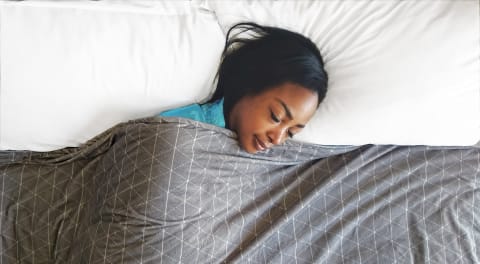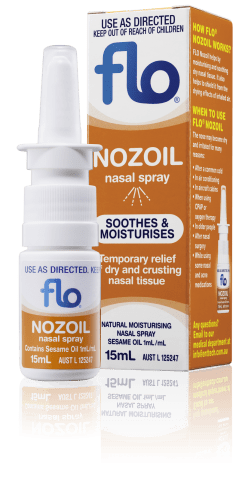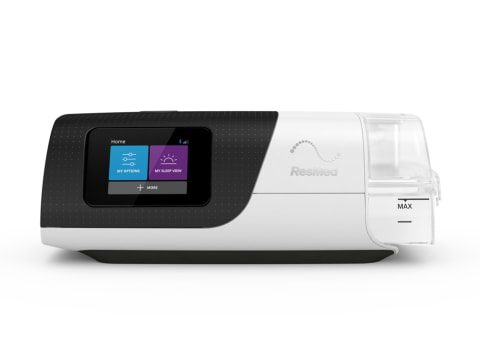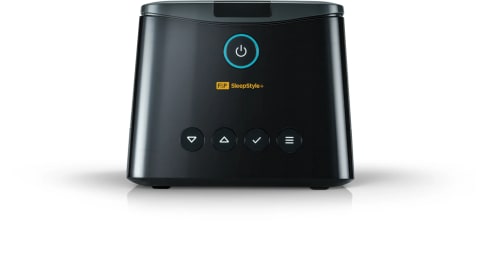Will CPAP Stop Snoring
Will CPAP Stop Snoring?
Snoring is a common issue that affects many individuals and their partners. While often dismissed as a mere annoyance, persistent snoring can be a symptom of underlying health conditions, notably obstructive sleep apnea (OSA). Continuous Positive Airway Pressure (CPAP) therapy is widely recognised as an effective treatment for OSA, but how does it influence snoring? Let’s delve into the relationship between CPAP therapy and snoring, exploring the benefits, considerations, and additional insights.
Quick Answer: CPAP Can Reduce or Eliminate Snoring
Yes – in most cases, CPAP therapy can significantly reduce or even completely eliminate snoring, especially when the snoring is related to obstructive sleep apnea (OSA). Snoring occurs when the tissues in your throat relax and partially block the airway, causing vibrations as air flows past. CPAP machines work by delivering gently pressurised air through a mask to keep your airway open during sleep. By preventing the airway from collapsing, CPAP addresses the root cause of OSA-related snoring. For individuals whose snoring is linked to OSA, CPAP therapy often results in a significant reduction or complete elimination of snoring.
Importantly, CPAP is considered the gold-standard treatment for moderate to severe OSA. Snoring is one of the hallmark symptoms of OSA, so when CPAP therapy treats the OSA, the snoring symptom is resolved as a bonus. Many patients notice a difference from the very first night on CPAP – no more gasping or sawing logs, just quiet, restful sleep. In fact, using a CPAP machine is one of the most effective ways to stop snoring caused by sleep apnea. The steady airflow holds your airway open and often leads to a major decrease in snoring right away.
When Snoring Persists: Understanding Other Causes
CPAP is designed to stop snoring caused by OSA, so if you’re using your CPAP and still snoring, something might be off. Ideally, once you’re on effective CPAP therapy, snoring should diminish significantly. Snoring that persists during CPAP use is a sign that your treatment may need an adjustment. Don’t worry – this is a common issue and usually easy to fix with the right tweaks. Let’s look at a few reasons snoring can continue and how to address them:
- Mask Leaks: An ill-fitting mask can allow air to escape, reducing the effectiveness of the therapy.
- Incorrect Pressure Settings: If the pressure is too low, it may not adequately prevent airway collapse.
- Mouth Breathing: Breathing through the mouth can bypass the benefits of nasal CPAP masks.
- Nasal Congestion: Blocked nasal passages can impede airflow, diminishing CPAP effectiveness.
- Lifestyle Factors: Obesity, alcohol consumption, and sleeping positions can contribute to persistent snoring .
In summary, snoring while on CPAP is not “normal,” and it’s usually fixable by identifying the cause and making the appropriate adjustment. If you or your partner notice that the snoring persists, don’t ignore it. Reach out to your sleep doctor or a CPAP therapist for help troubleshooting. It might be as straightforward as changing a mask cushion, cleaning the filter, or enabling a comfort feature on your machine – or it might require a bit of re-titration or an upgrade to an auto-adjusting unit. The good news is that with a supportive care team and the right tweaks, you can get back to silent nights.
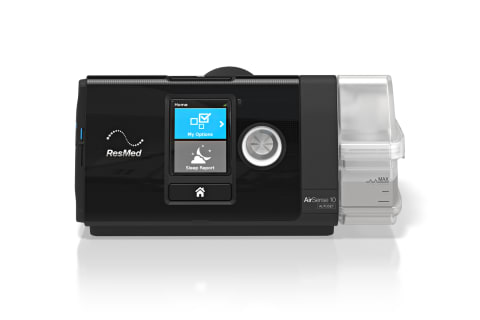 Further $50 Off with code "VALENTINES50"
ResMed AirSense 10 AutoSet 4G CPAP Machine
Further $50 Off with code "VALENTINES50"
ResMed AirSense 10 AutoSet 4G CPAP Machine
More Than Snoring: Additional Benefits of CPAP Therapy
Stopping snoring is a big deal – your nights become quieter and more restful – but it’s only one of the many benefits that CPAP therapy can bring. If you’re using CPAP for sleep apnea, you’re not just addressing the noise; you’re treating a serious condition in a way that can profoundly improve your health and quality of life. Here are some of the key additional benefits CPAP users often experience:
- Improved Sleep Quality: By preventing apnea events, CPAP promotes uninterrupted sleep, leading to better rest and daytime alertness.
- Cardiovascular Health: CPAP use has been linked to reduced blood pressure and decreased risk of heart disease.
- Mental Well-being: Users often report improvements in mood, concentration, and overall quality of life.
- Metabolic Benefits: CPAP therapy can aid in stabilising blood sugar levels, potentially reducing the risk of type 2 diabetes.
- Real-world tip: Embracing CPAP therapy as a holistic treatment can lead to significant improvements in overall health, not just the alleviation of snoring.
Sove CPAP Clinic: Your Partner in Snoring and Sleep Apnea Care
At Sove CPAP Clinic, we are dedicated to providing comprehensive support for individuals dealing with snoring and sleep apnea. We stay up-to-date with the newest and best in sleep therapy technology. We carry a full range of CPAP machines, masks, and accessories from top manufacturers.
Wondering about a comfortable mask? We have dozens of styles (nasal, full-face, pillows, even nasal cradle masks) and various sizes to ensure you find a perfect fit. Plus, you’ll find all the extras that make a difference: heated humidifiers and climate-controlled tubing (to prevent dryness), CPAP pillows (to ease sleeping positions with a mask), mask liners, chin straps, cleaning supplies, replacement filters – all the little things that add up to big comfort and success in CPAP therapy.
Our clinic is really a one-stop-shop for sleep apnea care. If it helps you sleep better, we will likely have it! Our services include:
- Personalised Mask Fittings: Ensuring comfort and optimal performance.
- Machine Trials: Allowing users to experience different CPAP models before making a decision.
- Ongoing Support: Regular check-ins to monitor progress and make necessary adjustments.
- Educational Resources: Providing information to empower users in managing their therapy effectively.
- Real-world tip: Engaging with a supportive clinic like Sove can make the transition to CPAP therapy smoother and more successful.
ALWAYS FOLLOW THE DIRECTIONS FOR USE. CPAP is used for Obstructive Sleep Apnoea treatment. When considering whether a sleep study or CPAP is right for you, speak to your doctor. Medicare criteria and T&Cs apply.
Frequently Asked Questions
Can I use a CPAP machine if I snore but do not have Sleep Apnoea?
While CPAP is primarily prescribed for obstructive sleep apnea (OSA), it can sometimes be effective in reducing snoring even if you do not have sleep apnea. However, it’s important to determine whether your snoring is caused by OSA or by another factor, as CPAP therapy is best suited for treating sleep apnea. A sleep study is recommended to rule out OSA before considering CPAP solely for snoring. If you only have primary snoring, other options like oral appliances or lifestyle changes may be more appropriate and comfortable. Always consult a sleep specialist before starting CPAP therapy.
How do I know if my snoring is caused by Sleep Apnea?
Loud, frequent snoring accompanied by choking, gasping, or witnessed breathing pauses during sleep may suggest obstructive sleep apnea (OSA). Other symptoms can include excessive daytime sleepiness, difficulty concentrating, headaches, and high blood pressure. A sleep study (either in-lab or at home) is the most accurate way to determine whether your snoring is due to OSA or is simple snoring. Discussing your symptoms with a healthcare provider and undergoing a sleep study can help ensure you receive the most appropriate treatment.
What CPAP machines are suitable for people who snore loudly?
Auto-adjusting CPAP (APAP) machines, like the ResMed AirSense 11 AutoSet and Philips DreamStation Auto, are highly effective for people who snore loudly, especially when snoring is linked to sleep apnea. These machines can automatically adjust the air pressure in response to your breathing patterns and snoring, providing the optimal pressure to keep your airway open throughout the night. Features like heated humidification and quiet operation also enhance comfort and compliance. Always seek professional advice to select the machine that suits your needs best.
Do nasal CPAP models help mitigate snoring?
Nasal CPAP masks are an excellent choice for many users, especially those who primarily breathe through their nose at night. They can effectively keep the airway open and reduce snoring. However, if you breathe through your mouth while sleeping, air may escape and therapy may be less effective. In such cases, using a full-face mask or a chin strap can help ensure effective therapy and reduce or eliminate snoring. The right mask fit is essential, and a sleep specialist can help you choose the best option.
Can I adjust the CPAP pressure to reduce snoring?
It’s important to have your CPAP pressure settings determined by a sleep specialist based on your sleep study results. Adjusting the pressure on your own without guidance could lead to discomfort or may not effectively address your snoring or apnea. If you’re still experiencing snoring despite using CPAP, consult with your healthcare provider, who can review your therapy data and make adjustments as needed to optimise your treatment.
Does Sove CPAP Clinic offer trials for people concerned about snoring?
Yes, Sove CPAP Clinic offers trial programs that allow individuals to experience CPAP therapy before committing to purchasing a machine. These trials typically include a comprehensive consultation, mask fitting, and use of a modern CPAP device at home. This hands-on experience helps you and your clinician determine whether CPAP therapy effectively reduces your snoring and improves your sleep quality. Ongoing support during the trial period ensures any issues are addressed promptly for the best possible outcome.




